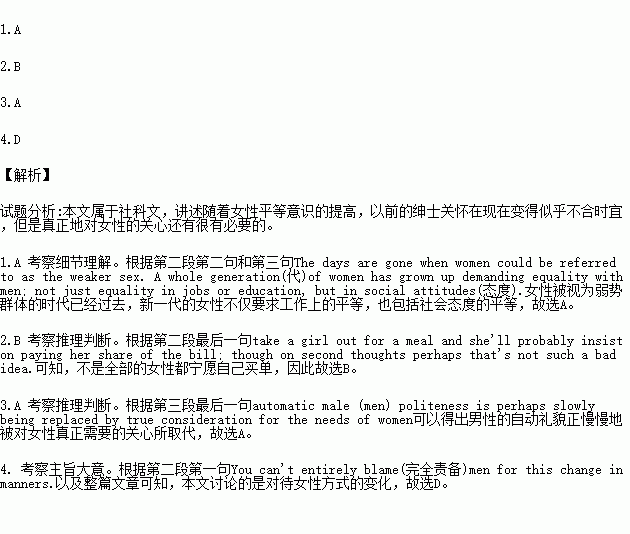题目内容
There was a time when, if a lady got onto a crowded bus or train, a gentleman would immediately stand up and offer her his seat. No more, though. Today, a gentleman will probably look out of the window, or, if he feels a bit guilty(内疚), hides behind his newspaper. Either way, the lady will have to stand until someone else gets off.
You can't entirely blame(完全责备)men for this change in manners. The days are gone when women could be referred to as the weaker sex. A whole generation(代)of women has grown up demanding equality with men; not just equality in jobs or education, but in social attitudes(态度). Hold a door open for some women and you're likely to get an angry lecture on treating women as inferiors(能力低下的人), unable to open doors for themselves. Take a girl out for a meal and she'll probably insist on paying her share of the bill; though on second thoughts perhaps that's not such a bad idea.
It's no wonder, then, that men have given up some of the gestures of politeness and consideration which they used to show towards women. On the other hand, automatic male (men) politeness is perhaps slowly being replaced by true consideration for the needs of women, so that men can see women as equal human beings.
Maybe that's worth standing in the bus or train.
1.The new generation of women wants to be ________.
A.treated not as the weaker sex
B.treated as the weaker sex
C.cared for on buses and trains
D.better treated than before
2.According to the passage, which of the following is not correct?
A.Some women may get angry if you open the doors for them.
B.Girls don't want you to pay for meal at all.
C.Some women may criticized (批评) you if you show too much politeness to them.
D.A girl may be unhappy if you insist on paying her share of the bill.
3.From this passage, we know that ________.
A.women need true consideration of their needs and feelings
B.men have given up some politeness they used to show to women
C.women often get angry if you are polite to them
D.women should stand in the bus or train
4.The passage mainly tells us ________.
A.gentlemen and ladies have equal rights on a bus or train
B.ladies wonder why gentlemen offer their seats to them
C.gentlemen consider politeness to be more important than ladies do
D.the change in manners has taken place between men and women


 eim Museum.
eim Museum.